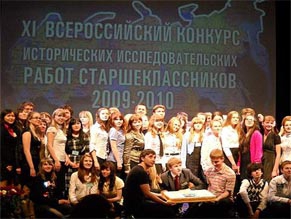|
Euroasian Jewish News

Participants of the competition (photo from memo.ru)
|
"Human in History" Competition Takes Place in Moscow
04.05.2010 In the Moscow theater center "Na Strastnom," the award ceremony for the 11th pan-Russian contest of research papers in history for senior high school studens "The Human in History. Russia - XX century." The contest was organized by the "Memorial" international society, the D.S. Likhachev International Charitable Foundation, the Russian Union of Local Historians, and the RSHU Department of Regional History. The Euro-Asian Jewish Congress (EAJC) award for the best work on Jewish history was presented to an 11th grader from Penza, Vadim Gavrilov, who wrote about the life of Jews deported to Penza during WWI.
The ceremony hostess, Iryna Scherbakova, who is the leader of the youth educational programs of "Memorial" and the irreplaceable ideologist of the contest, read the letter of the Euro-Asian Jewish Congress Secretary General Michael Chlenov. The letter read: "The history of the Jewish people in Russia during the last century is riddled with blank spaces. In many cases, these breeches are consequences of breaks in collective memory, which were created by the tragic events of the XX century: wars, the Holocaust, the 'Iron Curtain'.
The Jewish community of Russia strives to remember its history. And the school contest "The Human in History. Russia - XX century" is of immense help to us in this. During our cooperation, which began almost immediately after the creation of the Euro-Asian Jewish Congress, in 2003, dozens of works dedicated to the history of Russian Jewry have been presented to the competition. These works were about separate people, famous or not, and entire communities. Each of these works is a slice of life of Russian Jewry rescued from oblivion.
It is symbolic that this year, the award-winning work is dedicated to one of the least studied and tragic pages of the history of Russian Jewry - the deportation of Russian Jews from the front-line regions in 1915.
I hope that our fruitful cooperation shall continue.
Euro-Asian Jewish Congress Secretary General Michael Chlenov."
|
|
